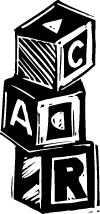
The ability to be productive is not something that is evenly distributed to each human. Take five random people and give them all the assignment to create a storage shed and a week to work on it. At the end of a week, how much variance would you expect to find? Some individuals wouldn’t have started while others would be completely finished.
There are several reasons for this. If one of your subjects happens to be a carpenter, it makes sense that he would make more headway than the Wal-mart clerk. So skill and past experience definitely have an impact. However, there is another difference that is even more important that has to do with how different people see a problem and what level they focus.
Let me give you an example. Let’s say one of your subjects starts thinking about a storage shed in terms of where to locate trees that can be hewed into lumber to build a shed. Obviously that person is going to take a much longer time to complete the shed than a carpenter who starts by sketching a plan and going to the lumber yard to buy the supplies. The first individual is dealing with much smaller “blocks” than the carpenter. The carpenter is thinking in terms of walls and roofs while the other individual is thinking in terms of single boards.
I suppose the logical extreme would be someone who starts by purchasing land on which to grow trees to be used as lumber in 30 years. That person would be using “blocks” like dirt and seeds. The person using the biggest “blocks” would probably be the one who goes to Home Depot and orders a storage shed to be delivered the next day.
The difference in between these approaches has to do with how each individual views the goal. One sees it as a product made from trees, another sees it as something made from boards and nails, and another sees it as a completed product that just needs to be ordered.
Consider another example. Let’s say we have three people who are put in charge of supplying a medium sized start-up company with computing infrastructure. Some individuals are going to deal with “blocks” like video cards and hard drives. They are going to research what each individual needs and build them a customized computer from the parts. Other individuals are going to deal with individual computers. They are likely to end up ordering a bunch of custom-configured computers from Dell or IBM based on each employee’s needs. The person dealing with the biggest “blocks” is probably going to start off by contacting a leasing company to work out the best deal possible and then using a standardized PC for everyone.
There is a very wide range here. One person is dealing with individual electronic components and another is dealing with the entire computing capability of the organization as a single unit. Even if the component person creates computers that are individually much better than any of the leased computers, his overall productivity will be much lower because so much energy is going into very small “blocks”.
One of the best ways to increase your productivity and effectiveness is by constantly forcing yourself to step back from your purposed solutions to see if maybe you should be working at a different level. Don’t spend all of your time trying to fix 10,000 pin hole leaks in a 40 year old roof–replace the roof, it is cheaper and requires less effort.
Originally published on January 29, 2006.
Leave a Reply